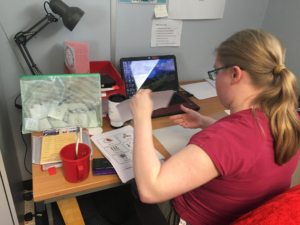10 Tips for Employing Autistic People

Context
I set up my company, Reachout ASC in January 2014. At first I worked on my own, but soon added another specialist teacher, and most crucially, I paid someone to do my bookkeeping (not my biggest strength). Now I have two part time employees, three self-employed associate specialist teachers and I’m holding on to that bookkeeper for dear life! We call ourselves a team… because being in this together is what makes the services and products of Reachout ASC as good as they are. It is a team effort. Two of our team are autistic. One of them is Cristina, who has given permission for me to share some of her story. I employed her as an office assistant four years ago. Cristina plays a vital role in preparing training materials, resource packs and general office duties.
I knew Cristina was autistic before I employed her. That piece of information was very helpful as it enabled me to interview her in a way that was comfortable for her. I knew from her CV that she had the skills I needed, but to get to know her properly, a formal interview would have not worked. So we met at a café of her choosing and had a chat. We talked about a lot of things, but I was able to ask particular questions that enabled me to make the decision to hire her.
The Law
The laws of employment are heavily weighted towards the employee and so it is not surprising that small business owners like me are wary of who they employ. It’s a huge responsibility when facing the decision of who will fit into your very small team and do the work you need them to do, efficiently and cheerfully (if we are in a small team, getting on together is of vital importance). It’s not unusual to be cautious and afraid of hiring someone who says they have a disability or condition you don’t understand. Running a small business, the onus of everything falls on you, and if it goes wrong, you stand to lose everything.
But the Equality Act of 2010 also gives us guidance to draw and be empowered from. Small businesses are ideal places for hiring people with disabilities because often you can make the reasonable adjustments that it is much harder to do in a huge corporation. I did some work with a big government organisation in my area. They wanted autism awareness training as they had autistic employees who were struggling. However, despite a couple of years work, nothing really changed. Their recruitment processes were not changed, their offices remained open plan and even pre-COVID they said they couldn’t be letting people work from home to get a break from the environmental sensory overload of a hot-desking office system. Every office in the country had been designed centrally and it could take years (or perversely a pandemic!!!) to change it. I was disappointed and at least one of the autistic employees had to leave through lack of support.
What we do
But as a small business owner I can do whatever I can to make the environment work for my employees. In our office, we did a sensory audit. And the feedback from Cristina and our other team members with differing needs led to us painting the walls blue to reduce glare, to switching off the automatic hand dryers and providing paper towels in the toilets. I decided to give all staff flexible hours as long as work was done and they let me know what they were doing and when, and setting up communication systems that were logical and accessible. We made all our policies easy read https://www.changepeople.org/getmedia/923a6399-c13f-418c-bb29-051413f7e3a3/How-to-make-info-accessible-guide-2016-Final which was appreciated by the whole team and made sure that any meetings had a clear agenda and each person had time to prepare what they wanted to contribute.
It’s a false economy to say you don’t have time to do these things because they actually benefit the whole team. We use a Kamban system to plan and prioritise our tasks and so each person knows what to do, when to do it and communicates when it is done. This was to help Cristina do her work, but was quickly adopted by others and it has led to much more efficiency in our team.
Cristina has also applied for and got Access to Work payments. This little known benefit can help many employees with the adaptations they might need to access work. Cristina uses it to get a taxi to work as public transport is far to much sensory overload for her. I definitely noticed the difference in her ability to start her work each day, once that trigger was taken out of the equation.
Of course, you might say, it is easy for you! As autism specialists it’s only right we know how to support autistic employees. But I also have people on my team with ADHD, epilepsy, OCD and dyscalculia, who are menopausal and diabetic. Any workforce is a mixture of people with different needs. I have just found that understanding and adapting our working practices have led to loyalty, efficiency and high standards because we practice what we preach!

What can I do?
10 tips for small business leaders.
- Have a read of the Equality Act and see it as opportunity not a mountain to climb. Talk to your staff about it and invite them to talk to you about any barriers they might have in doing their job efficiently. Remember the words are ‘reasonable adjustments’ and that means it has to work for you as a company as well as for the individual team member. There may be some small costs involved, but often a better organised system such as rules around interrupting people when they are working and an option to work from home could be more effective. https://www.c2e.co.uk/downloads/act_2010_advice_for_employers.pdf
- Think about your recruitment processes and how accessible they are or are not? Are your descriptions clear or ambiguous? Could you give interview questions out before the interview? Does it have to be formal? Can you think about how you can test skills over judging someone on their ability to give eye contact or not? https://nas.chorus-mk.thirdlight.com/link/lbubadmcykd2-axv9he/@/preview/1?o
- Know that some of your staff may be afraid of disclosing their needs and that they don’t legally have to. All you can do is make your workplace open to difference and respectful of all differences. People may have had terrible bullying and persecution before they came to work for you and so it needs to be handled sensitively. If someone discloses to you, it is confidential and if you use it against them in any way they can take you to a tribunal. So be honest, fair and document your discussions and support if need be. I ask my team to comment on their support each time we have a work review, usually twice a year and we document that.
- Remember this is a learning experience for everyone and the employee themselves may not know what reasonable adjustments will work for them. Just be open to learning together.
- Get your employment contracts right. I paid a HR company to draw these up for me asking them specifically to use clear and appropriate language that all my team could understand. This can be used as a template for all employees.
- Make job descriptions specific and review them regularly. We have some specific tasks for Cristina to do each week, but there are some others that may come up occasionally. The job description is a clear as possible with allowance for these additional tasks that develop with our work. The Kamban system can then be used as the main weekly task board. https://kanbanize.com/kanban-resources/getting-started/what-is-kanban
- Make hierarchies clear. I recently employed a new PA who took over supervision of Cristina’s work. We drew out the new staff structure so it was clear who was responsible for what and to whom, giving the new PA and Cristina some joint projects to help them establish a good working relationship.
- Make rules and reasons clear. Sometimes Cristina needs a specific thing pointing out because it hasn’t been made clear enough. Rules such as not taking personal calls in work time might seem obvious, but we always outline the obvious to everyone so that we are not relying on assumptions but clear facts and reasons why. This works well and no one feels they are singled out or blamed for anything.
- Problems should be discussed and solutions found together. Blame and discipline need not be part of any small business owners day to day management. If we have a problem we identify it and discuss what needs to change, how we might support that and then get on with it. This openness allows my team to tell me when I have done or not done something and it has caused a problem for them! It’s just become a normal way of working for us all and again leads to greater productivity and better services in the end. Trust in each other is at the heart of this and I can see it working best in a small business.
- Try to build up your employees skills by identifying their training needs. These days that can be done through webinars and you tube videos, never has training been so accessible. Keep a record and encourage all your staff to have a Professional development target and log all they are learning that benefits them in their job. This includes diversity and disability awareness but make sure you choose training that looks at positive abilities and does not just trot out outdated stereotypes of disabled people.
If, in the end, you or your employee can’t make something work, or somehow your employee has been dishonest with you, employers who have done all they can to support and make those reasonable adjustments can let someone go with the knowledge they have done the best they can.
There is a lot more help out there. Busy small business owners who don’t assess the different needs of their staff and don’t consider using the talents of the many differently abled people in the workforce are missing out on some very talented people. Start by committing to because Disability Confident employer by signing up for this scheme – https://www.gov.uk/government/collections/disability-confident-campaign#become-a-disability-confident-employer
…Then chat to your existing workforce, talk to one of the disability employment charities or the job centre about making a space in your company for someone who might have a disability who could do the work you offer. There is help out there and you as a small business owner could make a huge difference to your workforce as well as helping someone fulfil their potential.
Other people with different condition may not need an employment coach or long term support, but just some of those reasonable adjustments that enable them to give you their best work.
Further Reading
https://www.employmentautism.org.uk/
https://www.ambitiousaboutautism.org.uk/what-we-do/employment/toolkits
